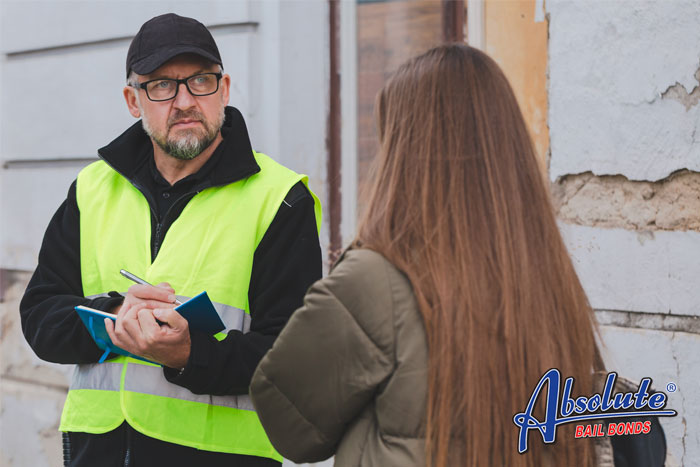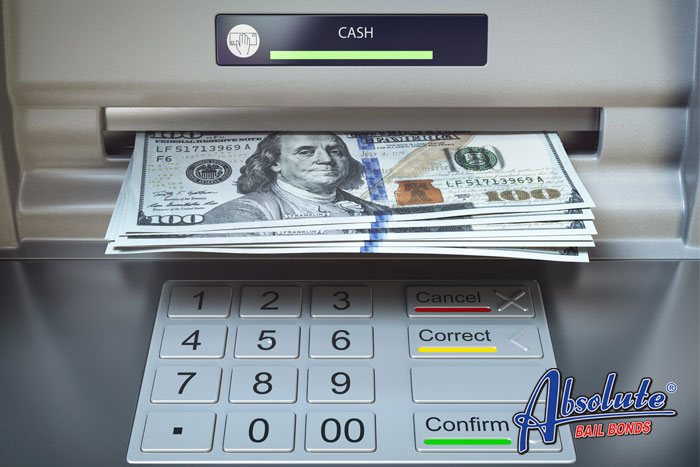
The Reality of Prop. 25
The November third election is a big one for California voters. Not only do they have to decide which candidate they want in the Oval Office, they also must decide if they want to vote for or against, Proposal 25.
What is Proposal 25
The goal of Prop 25 is to end the current cash bail system. If it passes, California would be the first state to do away with this system. Instead of using a tried and true cash bail system, the state would create a system that would run a “risk-assessment” on suspects. Each suspect would be assigned a risk which would categorize them as:
- Low-risk
- Medium-risk
- High-risk
Low-risk suspects would be individuals that, based solely on a generic test, would be determined a low-risk for not appearing in court and who were deemed a minimal risk to society. They would be promptly released from jail.
On the other hand, someone who is considered high-risk might not show up for their court dates and they’re deemed a threat to society. These individuals would not be released. Eventually, high-risk individuals would get a few moments before a judge, at which point they’d be allowed to explain why the high-risk assessment is unfair.
Individuals who fall into the medium-risk category pose a problem. They might or might not appear in court. And they might, in the right circumstances, be a threat to society. It’s not entirely clear how the courts would be expected to deal with medium-risk individuals, other than some lawmakers stating that cases would depend on the local court’s rules.
Individuals who have been charged with misdemeanors would be exempt from the risk exceptions, though lawmakers are quick to point out that there will be exceptions.
The Problem with Prop 25
At first glance, Prop 25 doesn’t seem like a bad idea. It has the potential to provide individuals with limited income who have created minor offenses with the ability to get out of jail. That’s a good thing, right? Maybe not.
First, even low-income individuals do have the opportunity to be released from jail. If they don’t have the money needed to bail themselves out, they can contact local family-owned businesses like Absolute Bail Bonds where they can take advantage of flexible payment plans that include zero% interest, 20% discounts, and low-payments.
The biggest problem with Prop 25 is that it doesn’t appear that anyone has a good way to run the risk assessments. Fans of Prop 25 haven’t been able to provide much information about how the assessments will be run or how they’ll be evaluated.
The current system provides the court to look closely at each person’s criminal and community history. This information is used to determine how much money is needed to convince the person to stay out of trouble and attend all of their court appearances. The fact that bail can be revoked if the person does violate the terms of their release by engaging with certain people, leaving town, or committing a crime provides further incentive for everyone to walk the straight and narrow path while they wait for their case to reach its conclusion.
The biggest concern with Prop 25 is that while fans of the proposed law are convinced it will work, they’re unable to provide any detailed information about how the risk assessment will be conducted. When you read the bill, all it says is that the risk assessment will use “tools shall be demonstrated by scientific research to be accurate and reliable.”
That sounds a lot like the type of system internet dating sites use, and everyone who has used one of those sites knows that while love matches are possible, most of the connections are massive duds. Does anyone really want to have a bail system that has the same kind of success rate as the average internet dating service?

Legal Responsibilities Attached to Witnessing a Crime in California
As you were walking your dog, you witnessed a hit and run. No one was hurt, but the fleeing car did do quite a bit of property damage. Suddenly you’re in the middle of a moral dilemma. Should you report the crime or should you pretend it didn’t happen and simply go home.
While no one can tell you what you should do, you should know that if the police find out that you witnessed the hit and run, or any other type of crime, you should report the incident. There are some crimes, such as child abuse, where failing to report the situation could land you in hot legal water.
Why You Should Report the Crime
Witnessing a crime triggers a strange surge of emotions. On the one hand, you know you have a moral responsibility to tell the authorities what happened. On the other hand, you can’t stop thinking that doing so will make you some sort of tattletale, a title you worked hard to avoid while you were in grade school.
What you have to understand that telling the police about a hit and run driver, or blowing the whistle on white-collar crime is not the same thing as telling your teacher that your best friend is jumping in mud puddles and splashing water on everyone.
When it comes to crime, no matter how small the issue might be, you have a moral obligation to report it.
How Much Time do you Have to Report the Crime?
When it comes to reporting a crime, sooner is better than later. Reporting the crime right away prevents someone else from going to the police and telling that you were on the scene and have failed to report the incident. The other advantage of reporting the crime as quickly as possible is that your memory of the incident will be clear, making you a credible witness.
What Happens if You Don’t Report a Crime?
There are some crimes, particularly those that involve children, that you’re legally required to report. Failing to report a crime that involves a child comes with serious legal ramifications. If you know a child is being abused or neglected you are required to report the crime to a child welfare professional or a police officer. You have to report the situation within 36 hours of witnessing the event.
The maximum penalty for failing to report a child is a $1,000 fine and a six-month jail sentence.

Unwritten Camping Rules to Remember
Camping is wonderful. Camping provides you with the means to connect to the earth and nature while also bonding with family and friends. The best thing about camping is all the great memories you collect during each camping trip.
The next time you’re about to hit the woods for an epic camping trip, keep these unwritten camping rules in mind.
Leave Your Site Better than you Found It
It doesn’t matter if you’re a slob at home when you’re camping, you need to turn into a neat freak. Commit yourself to keeping each place you pitch your camp cleaner than when you found it. Not only does this ensure that the next set of campers who come along will also have a nice place to set up camp, but it also proves that you are environmentally aware.
Keeping the campsites cleaner than how you found it includes cleaning up after your pets.
Don’t Leave the Fire Burning
California has had more than its fair share of fires. The last thing you want is to be the cause of the next wildfire. Making sure you douse the fire whenever you’re not sitting in front of is important. It’s a good idea to throw some water over the fire pit so that there’s no risk of a stray spark setting off a big blaze.
When you’re camping, take a little while to study your campsite. If the area is full of dry leaves, underbrush, and grass, hold off on starting a fire. If a spark jumps out of your fire pit and sets some of the dry matter on fire, the entire campsite will go up in flames before you have time to spring into action.
The Camp Bathroom isn’t your Kitchen
A surprising number of people who use campgrounds treat the campground’s bathroom like it’s their kitchen. They actually use the sink to wash their dishes. If you’ve never done this, great! If you have, make sure you don’t do it again. Not only is the practice a health hazard, but it can also play havoc on the campgrounds plumbing system and it’s rude to other guests.
Be Respectful While Camping
You’re on a great camping experience and want to have a good time, but that doesn’t mean you should leave your good manners at home. If you’re using a campground, you need to be respectful.
That includes things like:
- Not walking across someone else’s campsite
- Staying calm and quiet during the night
- Using low lights
- Keeping your pets and your kids under control
Following these simple unwritten rules of camping will increase the amount of enjoyment you get on your next camping adventure.

Strange Laws from California
When people think about laws, they often think about sensible rules that make sense. However, it is important to remember that laws are made by people, and this means that some real nonsense can be made into actual laws that govern the people. This is true of every country, state, and city. California is no exception.
The Golden State is home to its own bits of weirdness thanks to some odd laws. Many of these laws were created long ago, and as such, show their age. Others are a little more recent, and while it may be possible to see what the lawmaker was going for, the wording of the law isn’t quite right.
Why Are These Even Laws?
California became a state on September 9, 1850. Over the last 170 year period, a lot of laws have been enacted and removed across the state’s 160,000 square miles. Some of the laws have made sense, such as don’t steal from people and don’t kill each other. Others are a bit stranger. Some of the weirder laws that are still technically active in California include:
- A person can only wear cowboy boots in Blythe if they own two or more cows.
- A person cannot wash someone else’s car without the owner’s permission in Los Angeles.
- Cursing on a golf course in Long Beach is illegal.
- Detonating a nuclear device in Chico will result in a $500 fine.
- Flying a kite higher than 10 feet is illegal in the city of Walnut.
- Garages in San Francisco are meant for storing personal vehicles and nothing else.
- In California, it is illegal for women to drive cars while wearing housecoats.
- In San Francisco, ugly people are not allowed to walk down the street.
- It is illegal to drive in reverse in Glendale.
- It is illegal to pour salt on Hermosa Beach streets.
- Men and boys are not allowed to dress as women in Walnut unless it is for a play, or they receive a permit from the sheriff.
- Peacocks always have the right of way in Arcadia.
- San Diego homeowners can be fined $250 for having their Christmas lights up after February 2nd.
- Vehicles without drivers cannot drive over 60 mph.
- Visitors of Fresno city parks are prohibited from bothering lizards.
- Women may not wear high heels in Carmel city limits.
What Are the Penalties?
With how easily broken some of these laws can be, some people may wonder what would happen to them if they did break any of these laws. Luckily, the enforceable laws are pretty unknown by most law enforcement agents. Even if they do know about these laws, no one in their right mind would fault someone for breaking these laws.
The only law on the above list that will result in penalties, and rightfully so, is detonating a nuclear device within Chico city limits. However, the consequences for doing so will probably be more than just a $500 fine. The person will have to pay $501, at least.
These Laws Are Still in the Books
What seems to happen with a lot of these odd laws, is that they just get laughed at and forgotten. No one in this day and age is going to fine someone for wearing cowboy boots when they don’t own a cow, or arrest a woman for wearing high heels. Most of these laws are so outlandish that a person has nothing to worry about. These laws serve only as jokes at this point.

What Is Money Laundering and Why Is It Illegal?
Everyone is aware of the obvious fact that committing crimes is illegal. What can often get people into trouble is not knowing which acts are considered illegal in the first place. This leads to people doing something they thought was okay and then winding up in trouble with the law.
For instance, people are aware that stealing money from someone else is bad. However, many people do not realize that just depositing illegally gained money into a bank account is illegal. While it sounds a little, silly, there is a good reason for this.
The Definition of Money Laundering
The act of depositing illegally gotten money into a bank account, or any other legitimate institution, is called money laundering. This is a reference to how the person depositing the dirty money, because it was obtained from criminal activity, is trying to “clean” it by putting it to use in legitimate institutions such as banks and other businesses.
This crime is made illegal under 2 California laws: Penal Code (PC) 186.10 and Health and Safety Code (HS) 11370.9. The reason for the two different laws is the distinction between how the money was obtained. HS 11370.9 is only concerned with money that was obtained through all drug crimes. PC 186.10 covers money from any other type of crime.
Both of these crimes require specific intent or knowledge of criminal activity. In other words, money laundering can only occur when a person is knowingly trying to “clean” the money by placing it into a financial institution.
Why Is Money Laundering Illegal
After learning what money laundering is, some people are left wondering why the act is even illegal. Why punish someone for depositing illegally obtained money? Shouldn’t the illegal act be punishment enough?
For California, money laundering became illegal to help combat organized crime rings. In these crime rings, the lower-ranking people were the ones who would commit the illegal activity and therefore they were the ones who faced the consequences. Meanwhile, the bosses were able to get away with the money and without any consequences.
Making it illegal to handle criminally obtained money made it possible to go after the bosses of criminal organizations.
Penalties for Money Laundering
Money laundering is a wobbler offense under both PC 186.10 and HS 11370.9, meaning it can be charged as either a misdemeanor or a felony. How exactly it is charged will be dependent on the person’s criminal record and the crime itself.
When either crime is charged as a misdemeanor, the person will face:
- Up to 1 year in county jail.
- A max fine of $1,000.
When PC 186.10 is charged as a felony, a person will face:
- 16 months, 2 years, or 3 years in county jail.
- A max fine of either $250,000 or twice the amount of the money that was laundered, whichever is greater.
The maximum fine for this crime can increase if this is not the first time the person was convicted of money laundering. Also, the maximum prison sentence can increase if the total amount of money laundered was greater than $50,000.
When HS 11370.9 is charged as a felony, a person will face:
- 2, 3, or 4 years in state prison.
- A max fine of either $250,000 or twice the amount of the money that was laundered, whichever is greater.
It’s an Odd but Important Crime
Money laundering is a bit of an odd crime. For starters, it doesn’t involve laundry in any way. Then there is the fact that people are being punished for putting money into a bank account. However, as strange as this may seem, it does make sense. Making this simple act illegal allows law enforcement agents to go after those in charge of different crime organizations. This way, everyone in the criminal organization can get punished, not just those doing the grunt work.

Laws That Minors Can Break but Adults Cannot
Everyone knows what crimes are and what would happen if they were to commit one. This is just something that people learn over time. However, there is something about laws and crimes that people know, without ever really considering. What a lot of adults may not consider, is that there are somethings they can do without fear of breaking a law, while a minor would face legal trouble for doing the same.
What Are Status Offenses?
According to the law, there are plenty of things out there that adults can do, but minors cannot. This leads to an interesting section of the law where things are considered illegal, but only for minors. This means these acts can’t be crimes, because adults can do them pretty much any time they want. This is why the term status offense exists.
A status offense is any activity that a minor could get in trouble for doing simply because of their age at the time of the act. It is estimated that 20% of all juvenile arrests are due to status offenses.
Some of the most common status offenses that a minor can be charged with include:
- Being uncontrollable by parents or guardians.
- Consuming alcohol.
- Consuming marijuana.
- Consuming tobacco.
- Possessing alcohol.
- Possessing marijuana.
- Possessing tobacco.
- Running away.
- Skipping school.
- Violating curfew.
It is easy to see how these kinds of things affect minors, but aren’t a big deal for adults. Most adults don’t have to worry about skipping school or following their parents’ rules anymore.
Why Status Offenses Are a Big Deal
When people began to look closer at status offenses, they noticed the alarming trend that minors who committed status offenses were more likely to commit more delinquent acts in the future. This has led to many states, including California, to adopt programs and strategies aimed at achieving the following:
- Preserving families.
- Ensuring public safety.
- Preventing young people from becoming delinquents.
This is one of the many reasons why, when minors get into trouble they receive lighter penalties. The goal of punishing a minor after committing a crime is to teach them that their behavior was wrong and that they don’t want to commit that type of behavior again.
Penalties for Status Offenses
The penalties that a minor will face for a status defense can vary greatly depending on the minor’s record and the status offense they are being charged with. Some of the common penalties that a minor will face for a status offense include:
- Being required to attend an educational program.
- Being required to attend counseling.
- Having their driver’s license suspended.
- Paying a fine.
- Paying restitutions for any damages.
- Removing the minor from the care of the minor’s parent or guardian.
This is just a small sample of what a minor can face when charged with a status offense, and some of these consequences are more common than others.
Minors Need Different Rules
It’s a bit of an odd thought to realize that minors can get into trouble for doing things that some adults do daily without having to worry about breaking a law. However, many of these status offenses make sense. Kids should be in school, furthering their education so that they have a better chance once they reach adulthood. It wouldn’t make sense for many of these things to be made into crimes for everyone, which is why they are status offenses that only apply to minors.

If You Need Bail Help, You’ve Come to the Right Place
Were you recently surprised by the arrest of a close friend or family member? Are you trying to rescue him or her from jail? If so, you’ve come to the right place. For over 30 years, Absolute Bail Bonds has helped thousands of Californians bail their friends and family members out of jail. Let us help you too.
Here at Absolute Bail Bonds, we know how intimidating and confusing the bail process can be for the first time. This is why our bail agents do everything that they can to help guide you through this. Whenever you need help, whether it is one in the afternoon or four in the morning, you can count on our bail agents to be there for you.
Once you start talking with one of our bail agents, they begin working with you. Just tell our agents your loved one’s name, birthday, and county of arrest. With that information in hand, our bail agents will be able to locate your loved one in the county jail system and begin filling out the paperwork for the bail bond.
Our bail bonds only cost 10% of the bail they are for, and we provide each of our clients with personalized payment plans. These payments plans further reduce the upfront cost of the bail bond, and come with 0% interest. This means that you only have to pay for the bail bond itself, and don’t have to worry about paying extra just to make the bond more affordable.
Some of the other benefits that we provide include:
- 24/7 Bail bond service
- 20% Discount
- Phone approvals
- No hidden fees
- No collateral with working signer
- Se habla Español
If you were recently caught off guard by the arrest of a loved one, don’t panic, Absolute Bail Bonds is here to help. We have been helping Californians face bail since 1987 and we can help you to. You will always have a bail agent to talk to and answer your questions. On top of that, you will be provided with a bail bond and payment plan that you can afford.
There is no reason to wait any longer. Call 1-800-793-2245 or click Chat With Us now!

What Happens During the Booking Process?
There is a lot about getting arrested that most people don’t know. After all, most people don’t ever plan on getting arrested so why bother learning about something that will never happen. Unfortunately, an arrest isn’t something that can be planned, it just happens. Thousands of people get arrested every single day. Even if you don’t get arrested, one of your loved ones could be.
When a person is arrested, they aren’t sent straight to jail. First, they have to go through the booking process. During this time, information on the person is recorded and put into the system. This way the person can be identified in jail and the future if they ever get into trouble again.
The steps of the booking process are as follows:
- Recording a person’s name and other information.
- Taking a mugshot.
- Confiscating the person’s personal belongings.
- Taking fingerprints.
- Conducting a full-body search.
- Checking for warrants.
- Health screening.
- Checking for any affiliations.
- Taking a DNA sample.
When all of that information has been recorded, the person will be completely booked into the system. Once that happens, the person can be bailed out of jail, provided they have been granted bail. If you are ready to bail your loved one out of jail, then you should contact Absolute Bail Bonds in Los Angeles. We are always there for our clients, no matter what time it may be.
We provide all of the following for our clients:
- 24/7 Bail bond service
- 20% Discount
- Phone approvals
- 0% Interest payment plans
- No hidden fees
- No collateral with working signer
- Se habla Español
A person has to be completely booked into the system before they can be bailed out. Once a person has been booked into the system, you can bet that Absolute Bail Bonds in Los Angeles will be there for you. Our bail agent will be ready to go and will help get your loved one out of jail in no time.
Call 1-800-793-2245 or click Chat With Us now for a free consultation with one of our bail agents.

Are You Looking for Affordable Bail Options?
When you need to pay for something expensive, it is usually easier to do so with a payment plan. This is why Absolute Bail Bonds provides payment plans for all of our clients. This way, the cost of the bail bond is broken up and spread out over several months. By doing this, paying to get someone out of jail becomes much more affordable, but we do not stop there.
One of the biggest problems with bail, aside from the cost, is the suddenness of it. You never know when someone that you care about is going to get arrested. The only time you learn about the arrest is after it has occurred. This means that you can never really save up and prepare to post bail.
This is a problem that Absolute Bail Bonds has created a solution for. We are able to provide clients with approved credit a 0% down bail bond. If you qualify for this, we will bail out your loved one and you don’t have to make a payment for up to a month after. This gives you some extra time to save up money for the first payment.
We also provide clients who qualify with an additional 20% off the price of the bail bond. This means that instead of paying 10% of the full bail amount, you would only have to pay 8%. To qualify for this discount, one of the co-signers on the bail bond has to meet just one of the following requirements:
- Be a member of the military.
- Be a member of AARP.
- Be a union member.
- Be a homeowner.
- Have a private attorney.
As long as one of those requirements is met by one co-signer, you can qualify for the discount. Some of the other things we do for our clients include:
- 24/7 Bail bond service
- Phone approvals
- 0% Interest payment plans
- No hidden fees
- No collateral with working signer
- Se habla Español
At Absolute Bail Bonds, we do everything that we can to help out our clients. This is why we provide bail bonds that only cost 10% of the full bail price, 0% down for clients with approved credit, and a 20% discount off the cost of the bail bond for those who qualify. If you need affordable bail help, look no further than Absolute Bail Bonds.
For a free consultation, just click Chat With Us or call 1-800-793-2245 now.

How Are Bail Prices Determined?
There is a whole lot to take in whenever someone deals with bail for the first time. The part that almost always surprises people is the cost. Bailing someone out of jail in California is not cheap. It typically costs several thousands of dollars. While getting a bail bond is cheaper, reducing the cost of bail by 90%, it can still be an expensive undertaking. This causes many people to wonder how bail prices are determined in the first place.
Despite the fact that bail agents are often the ones to inform people of the cost of bailing someone out of jail, they are not responsible for determining the cost. Bail agents are regulated by California law to charge 10% of the full bail price. This is why getting a bail bond is 90% cheaper than paying for the bail yourself.
Law enforcement officers may set bail prices, but they don’t have a lot of say in the matter. Every year, each county in the state creates what is known as a bail schedule. This is just a fancy name for a list of every possible crime and the recommended bail amount for each one. The officers just follow that list, which means they don’t come up with the bail amounts either.
Bail amounts are determined by judges. They are the ones who get together and create the bail schedules. They are also the only ones who can alter bail amounts after they have been assigned. This often happens after a person’s first court date where a judge gets to really look at the case in detail.
If you want to rescue someone from jail, the cheapest way to do so is through a bail bond, which can be acquired here at Absolute Bail Bonds. On top of just being affordable, we will walk you through the entire bail process and answer all of your questions. With our help, you won’t have to face this alone.
Some of the services that we provide for our clients include:
- 24/7 Bail bond service
- 20% Discount
- Phone approvals
- 0% Interest payment plans
- No hidden fees
- No collateral with working signer
- Se habla Español

